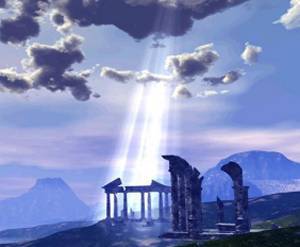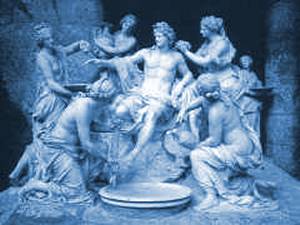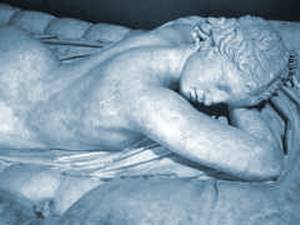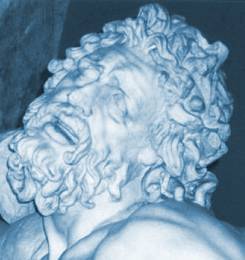Beckoning
Hand
Written by Paul Landis Delaune
|

|
When mankind fell, the gods fell.
Even I, Lord Zeus, have finally accepted this revelation. Once all,
the heavens and the earth, the gods and the creation, were at peace and
the Golden Age did flourish. Our fathers, the Titans, did rule and
the world was a paradise. Man walked with the Olympians in friendship;
the lion did frolic with the deer in harmony. The sky’s adoration
for the earth brought
forth in abundance the fruits of
happiness and contentment.
But man was not born to live in
paradise. Mankind is a rebellious lot, most unique of all creation.
He is not content to live in peace if it means to blindly follow the wishes
of his creators. For his breed there must be a reason and in the
pursuit of knowledge there is the tendency to make mistakes. Mistakes
bring confusion and turmoil. So numerous are the errors of man that
the effects have been compounded and amplified a million-fold through the
millennia since his birth. |

|
Nor were we, the Olympians, content
to live as gods. Man’s sin was his rebellion from the gods.
The sin of the gods was our creation of man in our image, for no sooner
had mankind forsaken paradise when we, the children of the creators, began
to mirror the behavior of the creation. We turned against our fathers
and defiled our foolish hearts
with the iniquity and wicked pursuits
of the creation.
We did make gluttons and drunkards
of ourselves. Our hearts did lust after the children of Eve, and
we practiced unnatural and bestial affections. We did fornicate and covet
the bed of our brothers. We did glory in the sinful image of man,
an image alien to the temples and gardens of Olympus. Insatiable
was our voracious appetite for worldly pleasures,
as we mocked the divine heritage
bestowed upon us by our fathers. |
Mindlessly did we plunge ourselves
into our every desire and in the doing discovered the door to madness.
Through this dark passageway some
of our more foolish brethren did wander, never to reemerge. For a millennium
we did court disaster, as we continued to indulge our every whim, blind
to the uncaring, unfeeling stupor devouring our holy nature.
| O, how man did laugh and
scorn; yes, scorn at the behavior of the divine!
Such was the penalty for our iniquity.
The gods, the object of worship and hope, became mere superstition.
No longer were we regarded
necessary and important in the
trials of life and death, but instead the thing to be ridiculed and disdained.
Slowly, man began to worship the
science of the agnostics, a most
evil heresy, and to honor the proclamations of its new priesthood above
the oracles of the uncreated. |

|
Finally, we – the almighty, wise
gods – learned the folly of our lustful indulgences and rediscovered the
wisdom of our fathers. Lust, drunkenness, gluttony, wanton behavior
is unseemly and of little
pleasure when experienced for its
own sake. As well did our enlightenment make us mindful of the iniquity
of the creation pursuing the example of the divine. Thus, did the
gods learn from our own madness.
In this new knowledge we sought
to once again stir and demand reverence and devotion from the hearts and
souls of mankind for the creators. However, the misdeed had been
done. Few men desired or saw
wisdom in honoring the gods.
The Olympians had become but fables, foolish stories told to children.
Even all our great might could not deter man’s heart from his new love.
Such was blasphemy of the highest sort.
We, I, commanded a great council
of all the gods to determine the punishment of the creation, for when man
sins his foolishness stains the innocent. But there was no debate
as to the fate of mankind. Death, total destruction, could be the
only solution. Such blasphemy could only be washed clean in the fires
of Armageddon. Upon this course of divine action we prepared ourselves.
The means, the engines of war and destruction, were put into place as we
warned our few remaining prophets of the impending doom.
But we tarried. As we gazed
upon the foolish creation, we beheld the reflection of ourselves.
In this image we remembered the birth of the world and the joy of that
once forgotten time. We remembered our fathers and their devotion
to the creation. We remembered the sky raining down sweet manna upon
the lovely earth. And of this precious pearl
responding in kind with the cherished
offspring of her fertile womb.
We had become captives of our devotion
and pride for the rebellious creature known as man. Yes, pride.
Even in its fallen state, mankin is the marvel of our eyes. None
else in all creation is so beloved. To expunge his sin from being
would force the gods to commit a greater heresy. The nature of divinity
demands obedience from our subjects, but we had long since relinquished
such honor.
Instead we had become content with
our newfound place in the heavens, enraptured with the endeavors of mankind.
Now man flirts with the powers of creation, and destruction, as he seeks
to harness the
knowledge of the cosmos’ birth.
For the heavens does he strive, as he foolishly ignores the gates to Hell.
But we, the gods, can merely point the way and hope such direction falls
not on deaf ears. Nonetheless, our beckoning hand is often ignored,
as the creation continues to grope in darkness for the keys to its own
creation. |

|



